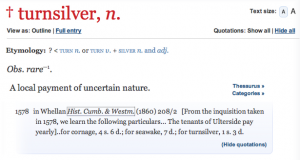{ 1 comment }
January 20, 2015dissertation
I have recently completed my master’s degree for Linguistics at the University of York. I am publishing the title and modified abstract for the 15000 word dissertation I submitted in September 2012 here as a reference for fellow linguists who may be be interested in obsolete English compounds and their link to language development. For any questions regarding the dissertation, Appendix A, or historical linguistics, please email: hughes.brianne at gmail.com
=====ʃʃʃʃʃʃʃ =====
From Turncoats To Backstabbers: How Headedness and Word Order Determine the Productivity of Agentive and Instrumental Compounding in English
=====ʃʃʃʃʃʃʃ =====
Abstract: According to a study by Clark et al (1986), English-speaking children spontaneously create exocentric V+N (turncoat) compounds during the development of agentive and instrumental compounding. Historically, the turncoat pattern has low productivity in English. Appendix A (attached) is a chronological list of all of the known turncoat compounds that entered English between 1050 and 2009. Only two new words of this pattern have been created in the past fifty years: Xpel-air and Pesterchum.
Turncoat compounds are advantageous for children learning verb-object (VO) languages such as English and Spanish because the pattern mirrors the syntax. Forms which are simple and transparent in accordance to the headedness and word order of a language are productive for both children and adults. Patterns that are structurally unclear, or that conflict with syntactic features, will be abandoned.
The advantage of simplicity that turncoat compounds offer to children is outweighed by its unmarked structure and many semantic limitations. The synthetic N+V+er (backstabber) pattern, on the other hand, complies with the headedness of English, is not limited by semantic clumping or verb transitivity, and can describe neutral objects as productively as it can reductive insults. Backstabber compounds also flourish in West Germanic languages, which share right-headedness with English.
Turncoat compounds are memorable and evocative descriptors of objects and occupations, but because of their clash with the headedness of English, their productivity cannot be sustained. Turncoat compounds will never challenge backstabber compound productivity.
=====ʃʃʃʃʃʃʃ =====
{ 3 comments }
October 21, 2012LONG STORY SHORT: I was looking for citation dates for buss beggar (someone who would kiss a beggar) and buz-bloke (a pickpocket) in Teall’s 1892 book English Compound Words and Phrases, and I stumbled upon this entry:
You saw that right: buttwoman.
{ 1 comment }
August 7, 2012I’ve had turnsilver in my list of verb-noun compounds since mid-June, but I’ve never taken a close look at it until now, as I finalize my list. The OED has a very short entry about it.
The OED definition says it may be a type of ‘local payment’, but the quotation seems to suggest that it is a service rendered for which the citizens must pay some amount. I note that turnsilver is worth less than cornage and seawake.
Cornage: 4 s, 6 d
Seawake: 7 d
Turnsilver: 1 s, 3 d
{ 1 comment }
August 6, 2012 /ˈflæpdʒæk/
/ˈflæpdʒæk/
I’m trying to figure out whether flapjack is an endocentric or exocentric compound. Flap is a verb, jack is a noun, and it’s a fun compound. If I can include it in my research, I’d like to. Is a flapjack a type of jack, or a thing (not a jack) that flaps jacks?
Flap from flapjack is listed in the OED under definition 4a. It has Germanic relatives.

— Do yourself a favor and act out the definition of flap as given above. Do it now. I defy you not to giggle while you do it. Descriptive words are amazing. You really get the feeling that you’re manhandling whatever it is between your hands. Wrestle it to the ground! Flap it!
{ 2 comments }
May 25, 2012Hi there neighbor. I’m doing something about compounds in English and Spanish for my MA Linguistics dissertation, and I’m 2-weeks in, and already knee-deep in books and articles about Romance compounding, exocentric synthetic compounds in English, deverbal complex words and right-hand-headedness. It’s crazy-go-nuts.
Just today I was thinking to myself, “Brianne, you’ve really gone down the compounding rabbithole…” and I immediately responded, “RABBITHOLE! ANOTHER COMPOUND!!” And then the first Brianne shook her head.
I’m learning some really interesting things that make me say “OH!” outloud in the quiet fairhurst building, (sorry fellow students), and I’ll share them when I have a more concrete direction that will make some of this preliminary research unusable, but for now this post is just a friendly resource for me to point new acquaintances to when I ooh and aah over compounds that appear naturally in conversation. Foolproof, handbook, footprint, pickpocket, straitjacket. I’m going to do this for the next 5 months…. at least.
{ 0 comments }
April 29, 2012*This is very like the first Tiny Dissertation post in its curiosity for the answer, its short lifespan, minimal scope of interest, and un-academic treatment of the subject.
Hypothesis: There should be compound words in Spanish songs, because they are very productive in Romance languages, so they should show up in songs.
Data: Lyrics found online for 10 songs in Spanish, each by a different artist, that I listen to a lot but have never thought about in regards to compounds.
{ 0 comments }
April 26, 2012Disclaimer: This post is about the process, not the result. You may be wasting your time by reading it.
 Premise: I am left-handed (and proud!) The QWERTY keyboard is preferential to the left-hand. 56% of keystrokes happen on the left-side. More than 3000 English words can be written with the left hand alone (i.e. reverberates), while only 450 are possible with the right hand (i.e. lollipop). There are various models of letter frequency in English, one order from most used to least is: ETAON RISHD LFCMU GYPWB VKXJQ Z with the left-hand letters in bold.
Premise: I am left-handed (and proud!) The QWERTY keyboard is preferential to the left-hand. 56% of keystrokes happen on the left-side. More than 3000 English words can be written with the left hand alone (i.e. reverberates), while only 450 are possible with the right hand (i.e. lollipop). There are various models of letter frequency in English, one order from most used to least is: ETAON RISHD LFCMU GYPWB VKXJQ Z with the left-hand letters in bold.
Question: Do internet acronyms follow the pattern of 56% left-handed frequency? What is the letter frequency for the most used internet acronyms?
Hypothesis: The top 2 vowels are on the left-side, and I think it’s mostly the vowels that creates this imbalance. Most words are not vowel-initial, so their frequency should go down in a study of acronyms. This means that the top consonants TRSDF would need to appear more frequently to maintain this ratio. I think overall, left-handed frequency should go down in acronyms.
{ 2 comments }
January 25, 2012






